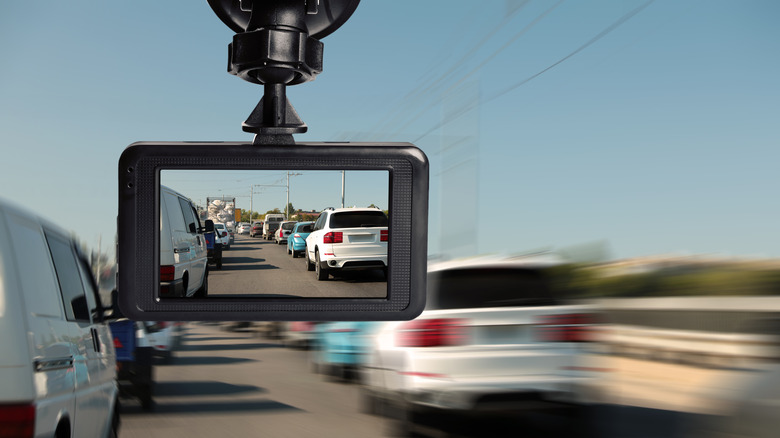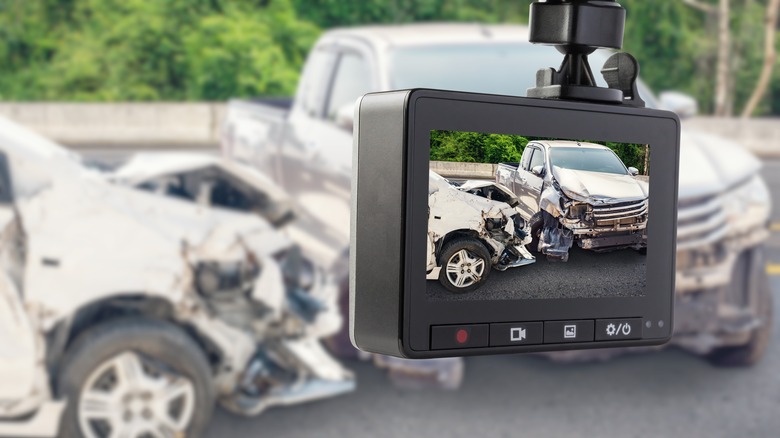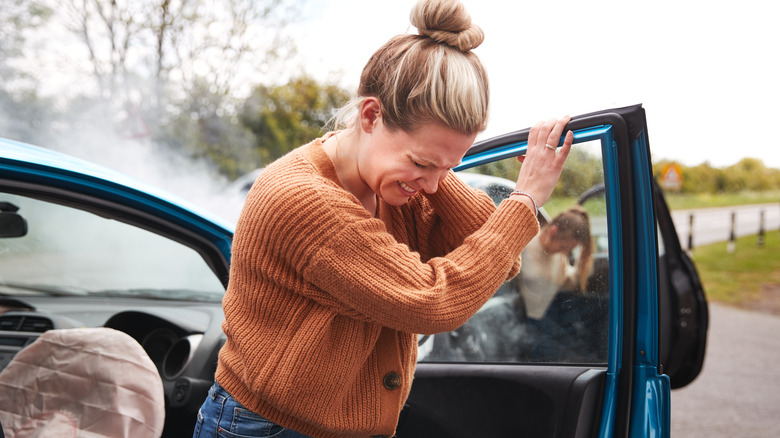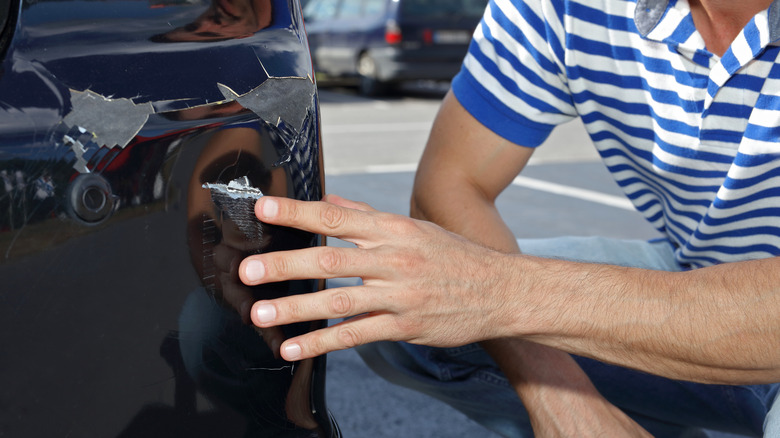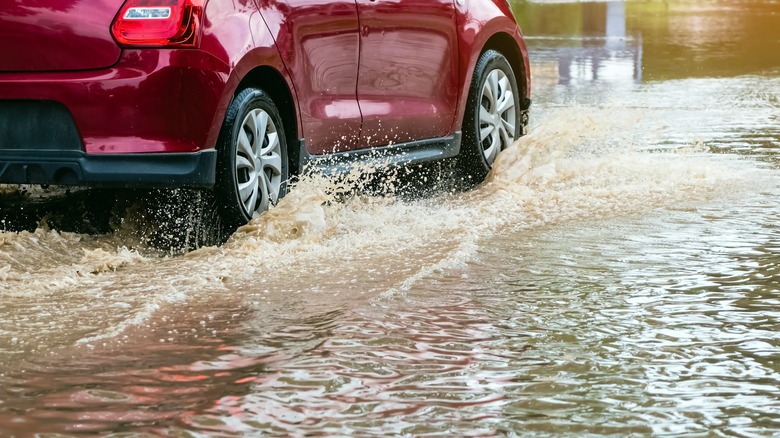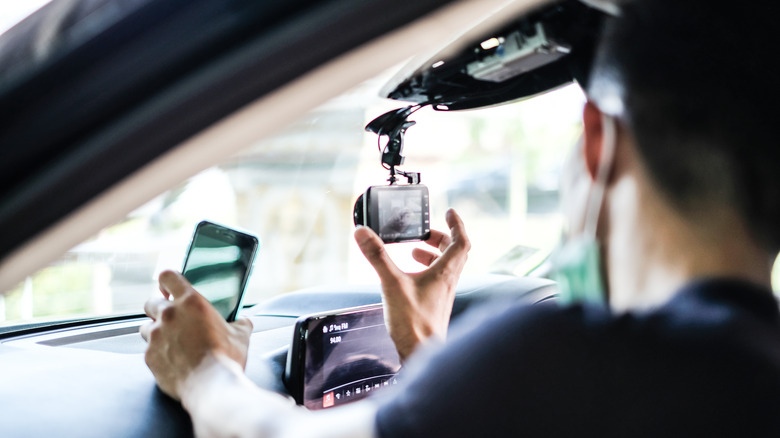Protecting Yourself On The Road: Why A Dashcam Is A Must-Have Upgrade For Your Car
Video has become part of our daily lives. You may have installed a video doorbell to avoid opening the door to unwanted solicitors, or security cameras to deter theft. Video has become so ubiquitous that most of us go about our days without thinking about how much we're being watched. That is, until something happens that reminds us that we're almost always being recorded.
As common as video is, many of us haven't thought about how useful it can be when we're out on the road. This is where dashcams come into play. While many people associate dashcams with law enforcement, their utility extends beyond the police. These compact cameras, like the Garmin Dash Cam Live, can be mounted on your car's dashboard, windshield, or rearview mirror to capture sound and video footage of your journey both inside and outside of your car, serving as a reliable witness if you get into an accident or have a dispute while out on the road.
Evidence in case of an accident
If you've ever been in a car accident, you know how chaotic and confusing the aftermath can be. Unclear memories and conflicting versions of events can make it difficult to settle claims and determine who was at fault. A dashcam is often the only eyewitness to an accident; without one, it's one person's side of the story against the other's, something that usually doesn't inspire much confidence and can be incredibly frustrating when you know you weren't at fault.
When you have video footage of what happened, you can easily prove your case. If you end up in court after an accident, dashcam footage is generally admissible as long as it meets the necessary legal requirements. This is because dashcam recordings often provide irrefutable evidence and capture the events as they unfolded, eliminating uncertainty about what did or didn't happen. This helps to resolve disputes, expedite the legal process, and protect the innocent party. Without video evidence, you may end up being held accountable for an accident you didn't cause.
Protection against insurance fraud
There's no getting around it: There are a lot of dishonest people in this world who'd like nothing more than to separate you from your hard-earned money. Insurance fraud is one of the ways they do this, and it's costly. According to Bankrate, the insurance industry in the U.S. pays out around $40 billion annually in false claims, with drivers paying about $700 annually in higher premiums to compensate for all the fraud.
Crash-for-cash schemes are one of the most popular ways scammers commit insurance fraud. This scam involves fraudsters deliberately causing accidents so they can make false claims for injuries or damages. Since they're after a big payday, they'll often target wealthy communities and people driving new, rental, or commercial vehicles, assuming they'll have the best insurance.
Investing in a dashcam for your car can help you catch these fraudsters red-handed. You can use dashcam footage to corroborate your version of events and what caused the accident. Depending on the dashcam, this information could include HD video and GPS data with the exact time and location of the crash and how fast the vehicles were driving. All of this information can help police and insurance investigators determine who was at fault. Not only that, but like a steering wheel lock, dashcams act as a visible deterrent and may dissuade criminals from targeting you in the first place.
Monitoring unattended vehicles
While most of us think of dashcams as providing us with an extra pair of eyes on the road, they can also be beneficial when your car isn't moving. Whether you've left your car in a large parking garage or unattended on a city street, a dashcam can capture footage of a thief entering your car, a hit-and-run accident, or a simple door ding while you're away from your vehicle.
Dashcams do this by operating in parking mode, allowing them to monitor your car even when it's not moving. This feature can be especially useful in urban areas where vandalism and theft are common. When your dashcam is in parking mode, it automatically starts recording if its motion and impact sensors detect any movement or collision involving your vehicle. The footage it records can help identify perpetrators and record the events leading up to the incident, providing clear evidence for insurance claims and police reports.
Just like a dashcam can serve as a deterrent for scammers trying to profit from crash-for-cash schemes, they can also deter potential vandals and hit-and-run drivers when you've left your car unattended in a parking lot or on the street. When criminals know their actions might be recorded, they'll probably think twice about targeting the vehicle.
Documenting the unexpected
Dashcams can do a lot more than catch thieves in the act and prove your side of the story in an accident; they're also useful for capturing unexpected events or emergencies. Those things that happen as we go about our everyday lives that catch us off-guard because they happen without any warning. Like car accidents, these unforeseen events can have significant legal and insurance implications.
For example, natural disasters like hailstorms, floods, and earthquakes can cause significant damage to your car, and a dashcam can record these natural disasters as they take place, documenting their impact on your vehicle. You can use this footage when filing an insurance claim for damage caused by this type of event. Without dashcam footage, proving the cause of damage could be an uphill battle.
Dashcams can also capture things like road rage incidents and criminal activity, providing a clear account of events that would otherwise depend on eyewitness testimony, which is notoriously subjective and unreliable. Footage from a dashcam can also help investigators and first responders piece together the sequence of events and assist insurance adjusters in accurately assessing claims and determining liability.
Encourage safer driving habits
It's human nature — we all behave differently when we know we're being watched. This likely holds true when there's a dashcam in our vehicle. A dashcam is a constant reminder that one's driving is being recorded, and this could lead to more conscientious driving. A survey by the RAC Foundation found that almost a quarter of UK drivers believed having a dashcam would improve their driving behavior. This suggests there may be a psychological effect where drivers are more likely to drive responsibly when they know their actions are being recorded.
Dashcams may also discourage reckless driving, which is often a concern of parents with first-time drivers, with good reason. Teenagers between the ages of 16 and 19 have a higher risk of being involved in a car crash than any other group. Knowing there's a dashcam monitoring their behavior and that their driving habits are being recorded for later review may encourage safer driving habits. Parents can also use dashcam footage to instruct teens by pointing out errors and areas for improvement.
